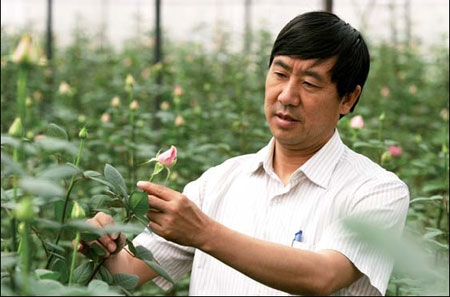Fragrance in the air
Updated: 2012-04-13 13:55
By Lu Chang, Li Yingqing and Guo Anfei (China Daily European Edition)
|
|||||||||||
|
 Zhu Yingxiong plans to build the world's largest production base for cabbage roses. Provided to China Daily |
Yunnan flower grower aims to make a mark in global rose oil market
Zhu Yingxiong always thinks several steps ahead.
Even though every winner at the Beijing Olympics in 2008 carried a bunch of his China Red roses in their hands, he knew his company needed something bigger.
Zhu, president of Lidu Flower Development Co Ltd, claims that despite being the largest cut flower company in China, the profit margins are still low.
"We need to move up the value chain by shifting our focus to the high-end segment and putting more efforts into innovation," he says.
The Kunming, Yunnan province-based flower company recorded revenues of 70 million yuan ($11 million, 8.48 million euros) last year, 30 percent higher than 2010.
To make that happen, Zhu, who was trained as an agriculture researcher, plans to roll out a wide range of fine products such as natural oil and rose tea by setting up the world's largest production base for cabbage roses - a precious fragrance used in cosmetics - in Yunnan.
"I wanted to expand my business, and shift from being just a flower supplier to a company that offers high-end flower products, as they generate more profits and overseas business," he says.
Zhu says Yunnan's subtropical climate is ideally suited for cabbage rose cultivation. He intends to use 667 hectares for that and annual rose oil yields are expected to be about 3 metric tons. This will make Yunnan the biggest fragrant rose supplier in the world.
Starting off as a flower supplier in 2000, Zhu has for long been cherishing the idea of making aromatic products from his own "garden". In 2010, he introduced the species of cabbage roses, also known as rosa centifolia, from France.
Also on the anvil are aromatic products like rose oil, natural rose water and rose tea, all under the brand name Lidu. The new products are likely to be launched sometime next year, he says.
The company has already invested 20 million yuan on breeding and research since 2010 and plans to invest 100 million yuan on similar activities over the next five years.
"Innovation is the key to success, because in the flower industry chain, upstream research and development and downstream sales constitute the key to high profits," he says. "No advertising is more convincing than a beautiful rose with powerful aroma and fresh color."
He believes the new species will help the company earn another 30 million yuan this year.
Zhu's estimate can be considered conservative as rose oil continues to be a scarce commodity in global markets, with prices expected to top 50,000 yuan per kg.
The volume of rose oil production in the world is 10 tons each year, while the actual demand is 30 tons a year, leaving a big gap between demand and production, according to estimates from the China Association of Fragrance Flavor and Cosmetic Industry.
"There's a huge potential in the rose oil market, because very few places in the world can grow this type of roses. Demand from the perfumery and cosmetic industry has also increased dramatically in recent years," says Feng Rui, director of the association.
Currently, rose oil mainly comes from two types of roses - cabbage roses in France and in North Africa and the famous rosa damascene in Bulgaria.
There are only three places in China that can produce these varieties of roses - Shandong province in the east, the northwestern Xinjiang Uygur autonomous region and Yunnan province with production of about 1 ton a year.
"With rising incomes and more people paying attention to lifestyle issues, the market is going to be huge," says Zhu. "It's a promising way out."
Contact the writers through lvchang@chinadaily.com.cn
Today's Top News
Rescuers race against time for quake victims
Telecom workers restore links
Coal mine blast kills 18 in Jilin
Intl scholarship puts China on the map
More bird flu patients discharged
Gold loses sheen, but still a safe bet
US 'turns blind eye to human rights'
Telecom workers restore links
Hot Topics
Lunar probe , China growth forecasts, Emission rules get tougher, China seen through 'colored lens', International board,
Editor's Picks

|

|

|

|

|

|





